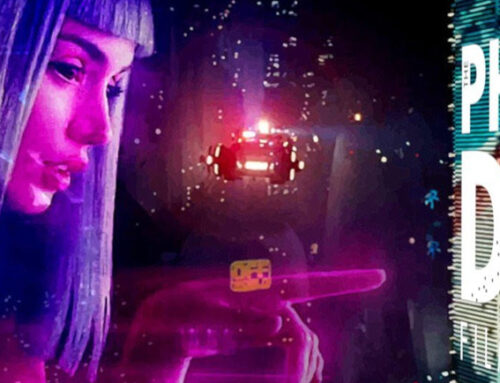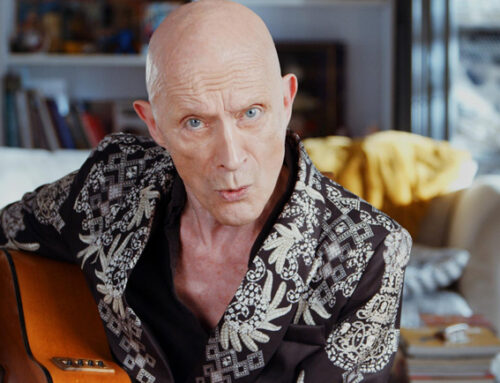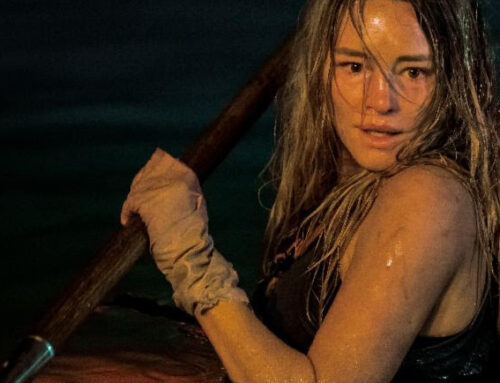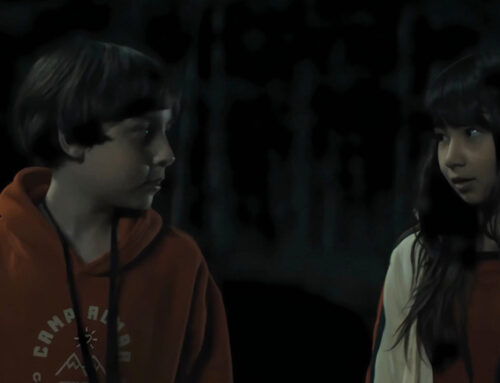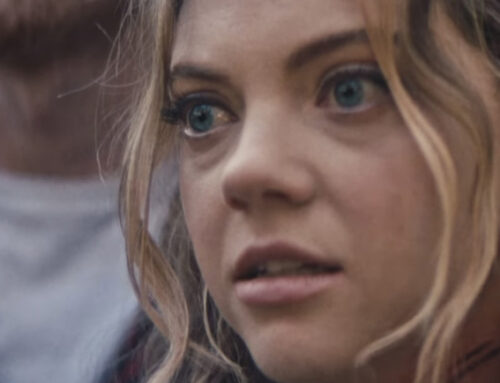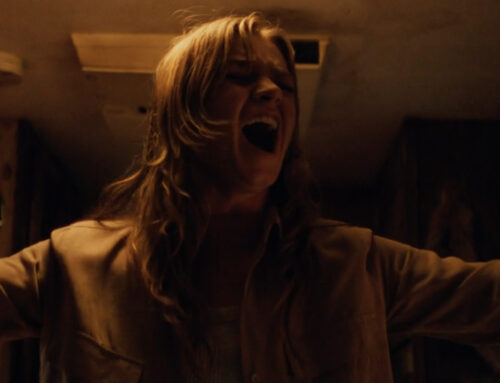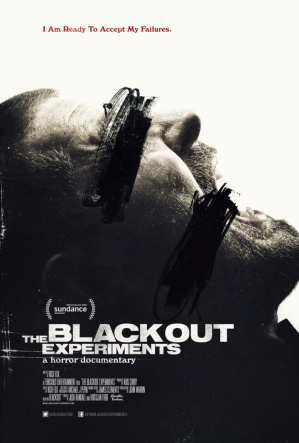 Rich Fox has had quite a couple of years. The Emmy nominated editor unveiled his latest creation, The Blackout Experiments, at the 2016 Sundance Film Festival as part of the Midnight Films series. Alongside such films as Rob Zombie’s 31 and Michael Keating’s Carnage Park, Fox’s doc took us into the lives of the devoted fans of one of the worlds most notorious horror experiences, Blackout. With the full cooperation of the haunt creators, Fox and his team documented the lives of a small group of fans of Blackout Haunted House.
Rich Fox has had quite a couple of years. The Emmy nominated editor unveiled his latest creation, The Blackout Experiments, at the 2016 Sundance Film Festival as part of the Midnight Films series. Alongside such films as Rob Zombie’s 31 and Michael Keating’s Carnage Park, Fox’s doc took us into the lives of the devoted fans of one of the worlds most notorious horror experiences, Blackout. With the full cooperation of the haunt creators, Fox and his team documented the lives of a small group of fans of Blackout Haunted House.
The film arrives in theaters and VOD in one week and we had an exclusive chat with the director about the film, Blackout, and his own personal boundaries. Follow along as HorrorBuzz chats with Rich Fox.
HB: How did the idea for The Blackout Experiments develop? Were you a fan of the haunt?
RF: I read about Blackout in an article about extreme haunts. After going to their website I was absolutely intrigued. The idea of going through alone, signing a waver and getting a safeword, it was mysterious and terrifying. As a documentary filmmaker I quickly thought this might be something really interesting to explore. Then my next thought was, oh shit, I’ll have to experience it myself to find out.
HB: What year was that?
RF: That was 2012, the first year that Blackout came to Los Angeles. So it wasn’t well known here at all. I was able to read some of the rumors that came out of New York, and could see they had a big cult following there.
HB: Rumors? Like what?
RF: As you know, you’re not supposed to talk about what happens inside Blackout, and publishing walkthroughs are not allowed. So people are very vague when they discuss the experience in reviews or message boards. I got the sense it was really intense, potentially violent, and the word “waterboarding” was thrown around a few times. Needless to say I was pretty freaked out.
HB: So you show up, 2012, and you go through. Was it anything like you had expected? How did it meet your expectations
RF: The experience was just as intense as I’d hoped, but in a much different way. It wasn’t about jump scares but instead was very psychological. They try to get under your skin and into your head. I was also pretty amazed as how far they pushed some taboo subject matter, and realized this was not meant to be “entertaining” but really push and challenge the audience. I loved all this, and realized it was a much deeper experience than I’d anticipated. Afterwards I was even more excited about pursuing the film because I saw there were so many layers to it.
HB: When did you realize there was a subculture of fans devoted to this moving experience?
RF: At first I didn’t know about the subculture. When we started following people in Los Angeles, they were all very new to the experience. It was during a conversation with one of the Blackout creators that they mentioned the “Survivors” — a secret group of hardcore fans in New York who had been experiencing Blackout for years. And they would only accept people into the group if they felt they really “got” what blackout was all about. And for many of them, the experience had become very profound and meaningful. So I was slowly uncovering just how deep a part of people’s lives Blackout could become.
HB: You decide, as a filmmaker, that this is something worth digging into. Were the secretive Blackout folks receptive?
RF: At first, they were not too receptive. The were very reluctant to destroy any of the mystery that had built up around them. They also said there were certain things they would never want to explain in the film about Blackout. So this was clearly going to be a challenge in making the documentary.
However, I was also not very interested in making a traditional “behind the scenes” type of film. I wanted the doc to be mysterious and feel more like a horror movie. So based on that, and also Blackout’s reluctance with being too exposed, we came to the idea of focusing the movie on the people going through the experience.
HB: Hence the focus on the fan community and the culture that Blackout has developed
RF: Yes, exactly. Ultimately it was more interesting for me to follow what drew people to Blackout and how it affected them over time. And part of that experience is fans reaching out and finding others who have gone through and appreciate Blackout. It’s very dark material and hard to discuss with your average co-worker.
HB: What did you find? What separated fans of Blackout from, say, other haunts
RF: That’s a great question. If there’s one thing many Blackout fans have in common and especially people we follow in the film, it’s that they’re very curious about themselves and willing to explore their dark side. For a lot of them, if they have an issue or problem in life, their instinct is to confront it. And Blackout becomes a way to challenge themselves and confront those issues head-on. Especially since Blackout gets to know the people going through and may choose to push their buttons. So, I think there’s an element of personal bravery and open-mindedness that I found very positive.
HB: Empowering?
RF: The experience can absolutely be empowering, which is fascinating since it also can be abusive and somewhat humiliating. But I think the feeling you get is, “I survived this, I confronted my fears, and I feel better about myself for doing so.”
HB: Why Blackout “Experiments” and not experience? What is the Experiment?
RF: The “experiment” refers more to the idea of the film than specifically about Blackout. There are so many ways to look at Blackout — is it a haunted house, extreme theater, or a psychological experiment? It’s potentially all those things, but for me the psychological experiment aspect was the most interesting. The idea that each person is confronting their fears, and Blackout is experimenting on them to see how they’ll react when confronted by those fears.
HB: Did you learn anything about yourself during the making of the film?
RF: I learned that in many ways I do have a lot in common with the subjects of the film. I like to challenge myself. I think life is more interesting when you don’t get stuck in a routine or play it safe. And so I admire those things. At the same time, while I enjoy and appreciate Blackout, I don’t think Blackout is the way I would choose to confront my own fears. There’s a limit to how far I would take it. The last scene in the movie, I don’t think I would want to experience that myself.
HB: What scares you then?
RF: It can be difficult for me to be in a situation that I can’t control. And so giving up control to Blackout is a scary idea. Also, I have issues with privacy, so the idea of Blackout entering my house, my own personal space, isn’t something I think I could handle. For me, that would be crossing a line. At the same time, I understand the appeal of it.
HB: Control is terrifying to lose. Ironic that the creators of Blackout exert such control to have others give it up. How did you convince them to allow you into the inner workings of such a nebulous organization?
RF: It was a matter of time and establishing trust. When we started the project Blackout only agreed to let us film one event to “see how it would go” Like a first date I suppose? But I think they slowly realized we were coming at it from the right place, and that the film would be something they could embrace and support. And ultimately they wanted the film to be successful, so they had to give us access to some things that they were initially hesitant about.
HB: How was working with Josh and Kris
RF: They are great. Both are extremely smart and talented but also humble and collaborative. So there never was a personal issue working with them.
HB: Of course. Were there any threads or stories that you wished you could have develop more?
RF: Sure, I think one of the hardest aspects of making a documentary is keeping your focus since there are so many threads that are interesting. The New York group had a lot of stories that I couldn’t include since it wasn’t part of the main story. The actors had great personalities and described humorous situations I would have liked to show. However, it was too much “pulling back the curtain” and ultimately made the experience feel less threatening.
Luckily in the bonus material I was able to include some things that didn’t fit in the film. There’s more behind the scenes footage, extended sections of the interview with Josh and Kris, and I put together a sequence with a great subject named Omar who unfortunately didn’t fit into the narrative but had plenty of interesting things to say about Blackout.
HB: Wonderful. I look forward to seeing those. The DVD comes out when? Is there a premiere we should know about?
RF: The movie will be released on Friday July 22nd, in theaters in 11 cities and on many VOD platforms. (http://www.theblackoutexperiments.com/watch/) If you live in Los Angeles, you may want to attend the 7:30 screening in North Hollywood on the 22nd. There will be a special Q&A with the filmmakers, the cast, and Josh Randall from Blackout.
HB: AWESOME! We will be there! Thank you for taking the time to chat with us man
 And that, as they say, was that. Of course you now have the chance to be part of an official Hollywood Premiere. Next Friday night, The Blackout Experiments will be screening.
And that, as they say, was that. Of course you now have the chance to be part of an official Hollywood Premiere. Next Friday night, The Blackout Experiments will be screening.
